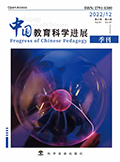

孟子和荀子, 作为先秦时期儒家伦理思想领域的杰出代表, 各自以独特的视角深刻阐释了儒家伦理的精髓, 尽管他们的出发点截然不同———孟子秉持“性善论”, 提倡“教化”, 注重个体修身养德。而荀子则主张“性恶论”, 强调“教化”、“刑罚”, 通过道德教育和法律制度来约束人的恶性。实则二者的思想差异互补, 都十分重视后天的教化作用, 提出“尽心养性”和“化性起伪”的道德教育方法。本文通过对比二者的思想根基、分别形成的体系以及德育方法使孟子荀子的德育思想实现创造性转化和创新性发展。提出要结合孟子和荀子的德育思想, 从教育者、受教育者以及教育方法多个方面共同推动思想政治教育的发展。师者应“德育为先、仁爱为本”, 做学生为学、为事、为人的大先生, 引导学生向善, 知善、行善; 新时代青年要坚持“自我教育, 知行合一”; 在教学中实施“环境熏陶”“目标设置”的方法, 促进学生全面发展。本文比较分析孟荀思想不仅有利于培养能书写好第二个百年答卷的新时代中国青年, 更有利于弘扬好以孟荀思想为重要组成部分的中华优秀传统文化。
Mencius and Hsun Tzu, as prominent representatives of Confucian ethics in the pre-Qin period, each profoundly expounded the essence of Confucian ethics from a unique perspective. However, their starting points are completely different—Mencius upholds the “theory of original goodness of human nature”, advocating “education”, and focuses on individual self-cultivation and moral cultivation. Hsun Tzu, on the other hand, advocates the “theory of evil humanity”, emphasizing “education” and “punishment”, and restraining peoples viciousness through moral education and the legal system. In fact, the differences on ideologic between the two complement each other, and both attach great importance to the role of acquired education, and put forward the moral education methods of “ Nurture the Soul and Refine the Character ” and “Transform. Innate Nature”. By comparing the ideological foundations, the respective systems and moral education methods, this paper enables the creative transformation and innovative development of Mencius and Hsun Tzus moral education thoughts. It is proposed that the development of ideological and political education should be jointly promoted from the aspects of educators, educated people, and educational methods in combination with Mencius and Hsun Tzus ideas on moral education. Teachers should “moral education first, benevolence first”, be a great gentleman for students to learn, do things, and be people, and guide students to being the good, knowing the good, and doing the good; young people in the new era should adhere to “self-education, unity of knowledge and action”; implementing the methods of “environmental edification” and “goal setting” in teaching can promote the all-round development of students. This paper compares and analyzes the Thoughts of Mencius and Hsun Tzu not only to cultivate Chinese young people in the new era who can write the answer sheet for the second centenary, but also to carry forward the excellent traditional Chinese culture with Meng Xun Thought as an important part.